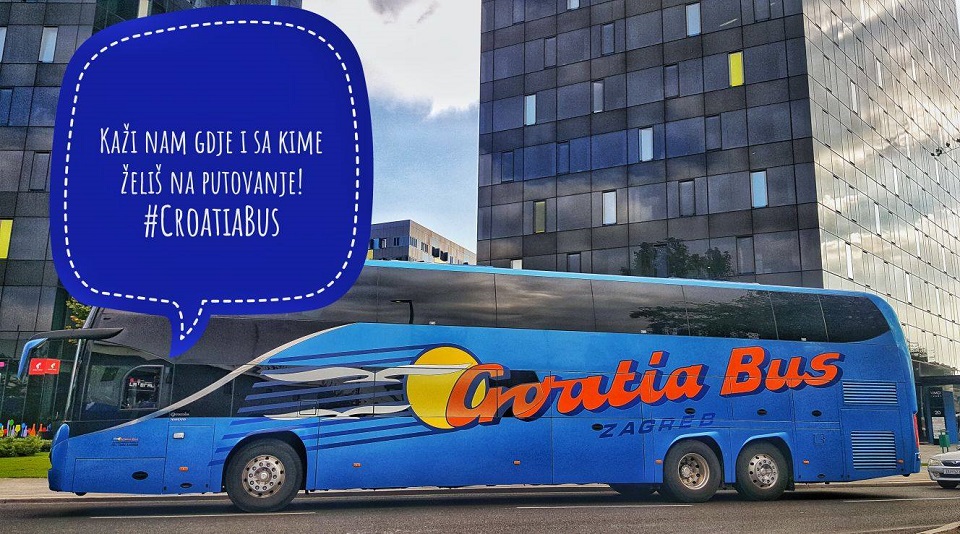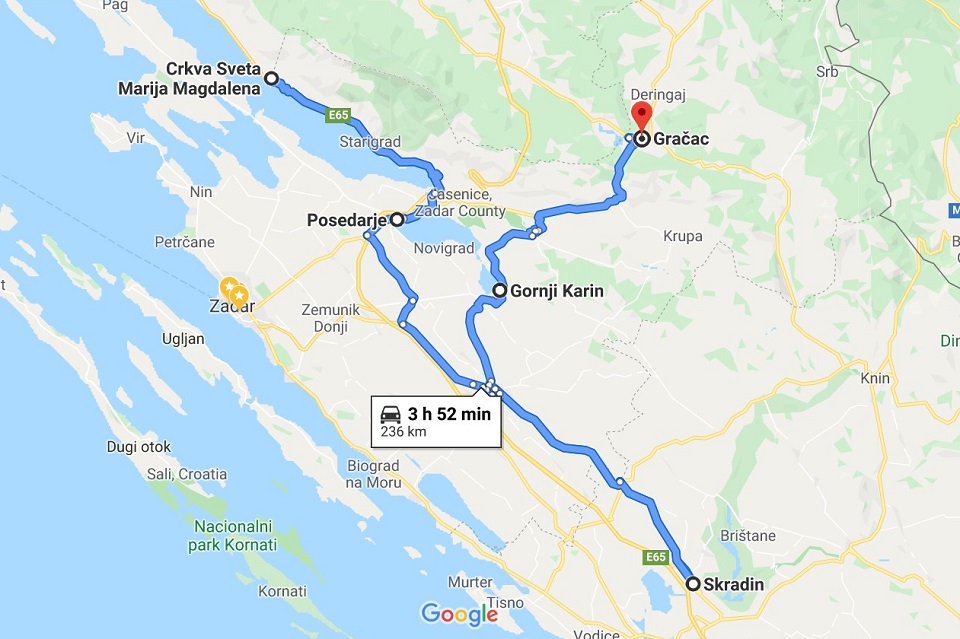Croatia Bus Split to Zagreb Gets Lost: Takes Four Hour Detour
We’ll never get there! Due to a detour, an early morning Croatia Bus from Split to Zagreb went astray yesterday, and passengers were on the edge of their nerves. “We've gotten lost ten times, and I'm afraid we will end up in the sea!” one outraged passenger reported from the lost vehicle.
“It is 9:40, and we should have arrived at our destination by now, but we are 300 kilometers from Zagreb. Your drivers demonstrate an inadequate, irresponsible and disinterested approach to their jobs. Worst of all, they don't even help each other solve problems. We’ve gotten lost at least ten times so far!”

Tell us where and who you want to travel with! | Croatia Bus
Angry Croatia Bus Passenger Gave Location Updates
The angry passenger, one of many who was extremely late to his destination, wrote to the management of Croatia Bus. He left yesterday morning at 4:30am on the bus from Split to Zagreb, and as things stood at 9:40am, they would not arrive until 1pm, according to Slobodna Dalmacija on January 20, 2020.
The Croatia Bus drivers were forced to take a detour due to the bura (or bora, which is an extremely high Adriatic coastal wind), which closed the section of the A1 motorway between Posedarje and Sveti Rok for all vehicles except passenger cars. All others, including buses, were diverted to state roads via Gračac, Obrovac and Karin.
Maslenica Bridge Closed 10 Cumulative Months Since 2008
TCN has written about the frequent closures of this section of the A1 motorway due to high winds, which frequently make crossing the Maslenica Bridge unsafe for most, if not all vehicles. This section of motorway, which includes the Maslenica Bridge, has been closed for 10 cumulative months since 2008 due to unsafe winds.
“As Sveti Rok tunnel was closed, we exited the motorway and the drivers veered onto the Adriatic highway towards Karlobag. We almost reached Sveta Marija Magdalena! There, the drivers turned back after they were informed that the road was closed. We've turned around, and what do you think happened next?” wrote the dumbfounded passenger.

Posedarje - Crvka Sveta Marija Magdelena - Skradin - Karin - Gračac | Four Hour Detour Route
After Heading Toward Karlobag, Croatia Bus Goes to Skradin
“To Skradin, yes, you heard right - Skradin just above Šibenik, and 90 kilometers from Split, our departure station. Now we're finally driving to Zagreb, and we're around Karin. There is a lot more I could write, but I'm afraid we’ll get lost again, I don't know which direction we'll head next time, maybe we’ll end up overseas,” seethed the furious passenger.
His story was confirmed to at the traffic office of Croatia Bus later that morning. At that time, they verified that the bus was somewhere around Gračac, which was 250 kilometers away from Zagreb. The Croatia Bus official acknowledged to that the drivers couldn’t find their bearings after being sent off on a detour before Sveti Rok tunnel, so they went the wrong direction (several times).
Croatia Bus was asked if passengers, many of whom certainly had to be in Zagreb yesterday morning due to urgent obligations, would be compensated. Because who else would take a bus at 4:30 in the morning? An employee of Croatia Bus recommended contacting their legal team.
Follow our Travel page to keep track of lost buses and wind-related road closures.
Operators Warn Unprofitable Bus Lines May Be Abolished
ZAGREB, January 13, 2020 - Unprofitable bus lines operated by private companies inside counties and between counties have not yet been abolished, and problems faced by these companies remain, the head of the association of private companies providing bus services, Hrvoje Meštrović, said on Monday.
Meštrović told Hina that all options were on the table, including scrapping loss-making lines.
Members of that association cover 80% of bus commuting service across counties.
Meštrović says that county authorities are trying to solve the problem because they do not want bus lines to be eliminated.
However, Ana Falek of the Croatian Employers Association (HUP) says that she fears that counties with poorer budgets will not have enough money to cover the difference in costs for unprofitable commuting lines run by private bus companies. "There is no progress. It is a status quo," she says.
According to HUP estimates, 318.5 million kuna should be set aside annually in subsidies to private bus companies that cover unprofitable routes within the public transport system.
Private bus companies hired to run public lines transport 200,000 passengers a day. However, their annual losses due to unprofitable commuting lines come to 300 million kuna, according to HUP calculations.
Annual revenues of private bus companies come to 364 million kuna, which is 5.92 kuna per kilometre covered, as against an estimated economically viable yield of 11.10 kuna per kilometre.
HUP warns that the current rules for public transport bus services, adopted on 29 November by the Ministry of Transport and Infrastructure, is the least favourable for the regions of Lika, Gorski Kotar, Bjelovar, Virovitica and Požega-Slavonia as they may lose the largest number of public bus lines.
More bus transport news can be found in the Travel section.
Slovenia's Nomago Eyeing Acquisitions on Bus Transport Market in Croatia
ZAGREB, August 8, 2019 - Slovenia's bus transportation provider Nomago, which on Thursday took over the Brebus Integral company in the eastern town of Brežice near the border with Croatia, has stated that it is set to take over 30% of Croatia's bus transport market.
Nomago, which introduces itself as "a travel and mobility provider with over 600 passenger buses operating in the region between Venice and Dubrovnik", intends to take over at least 30% of Croatia's market according to its medium-term plans.
It has now the two branch offices in Croatia: one in the capital city of Zagreb and the other in the coastal city of Pula.
The Nomago director Sandi Brataševec said today that the acquisition of Brebus Integral was aimed also at strengthening Nomago's presence in the region.
The company says on its web site that it "offers full travel and mobility service – from airport transfers, flights, accommodation, travel insurance, travel packages to charter buses and VIP transfers."
More news about bus transportation in Croatia can be found in the Travel section.
Flixbus Launches New Services from Eastern Croatia
ZAGREB, March 22, 2018 - The eastern Croatian areas of Slavonia and Baranja will be connected with new bus services to Hungary, Austria, the Czech Republic and Slovakia, including the airports of Budapest and Vienna, to be operated by the Flixbus company.
Some Practical Info about Split Bus Station
In terms of location for a bus station, it is hard to beat Split. Stepping off the bus, one can almost walk onto the ferry, board the train or wander to the city's main attraction, the 1,700 year-old Diocletian's Palace.
Given the lack of coastal train routes (Split is only meaningfully connected with Zagreb by rail - click here for more info on Split train station), the bus is the most popular public transport option from other parts of Croatia to Split, and the city is well connected with routes to Zagreb, Dubrovnik and coastal destinations further north.
The bus station itself is quite small, and its waiting room includes a cafe. All other amenities are close by, including public toilets and luggage storage 20m to the right of the exit (another option is the storage lockers in the train station waiting room next door on the right - 15 kuna for 24 hours).
Timetables are available on the walls of the waiting room, but there are three other options for getting the information. The first is a very useful online timetable, which is both in English and easily navigable. The second is to ask the sales assistant for copies of the required timetable - all the timetables are available for free distribution as the sales counter. A third option is to check out our Split bus resource page, which we are building steadily, and which will include plenty of information about latest timetables and other bus-related information. Visit the page here.
Information already available on the page includes:
Bus times from Split to Dubrovnik and back
Bus times from Split to Zagreb and back (when travelling to Zagreb, check which buses are going via the motorway - much quicker)
Bus times from the station to the airport in Split
There is a Jadrolinija ferry ticket office across the street from the station, or turn left and head to the main ferry building 50m, where you can also buy tickets with other ferry companies such as Blue Line. Luggage porters, such as the in the picture above, are freely available.
Sales staff speak English. Tickets will include the platform ('peron'), all of which are clearly numbered in front of the station. Luggage is stored in the undercarriage of the bus, and there is a charge for this.

.JPG)
.JPG)
.JPG)
.JPG)
